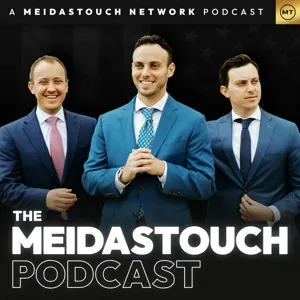Podcast Summary
Misrepresentation of a student journalist's article at Oberlin College: Inaccurate reporting can lead to misinformation and larger discourses, highlighting the importance of fact-checking and context in understanding campus controversies.
The Bon Me incident at Oberlin College in 2015, which was initially portrayed as a controversy over free speech and student complaints, was actually a misrepresentation of a student journalist's article about the quality of food in the cafeteria. The incident gained attention from right-wing media, turning a common student complaint into a larger discourse about supposedly "woke" students. However, it wasn't until four years later that the true story was revealed through a retelling from the Columbia Journalism Review. This incident highlights the importance of accurate reporting and the potential for misinformation to spread quickly in today's media landscape. The student journalist involved was just learning the ropes of journalism, and her article was a low-stakes assignment to fill pages in the student newspaper. The incident serves as a reminder of the importance of fact-checking and context in understanding campus controversies.
Students at Oberlin College express concerns over culturally inappropriate modifications to international dishes: Foreign students argue that serving international dishes without respecting their authenticity and cultural significance is an instance of cultural appropriation
Students at Oberlin College have expressed concerns over what they perceive as culturally inappropriate modifications to traditional international dishes served in the dining halls. Deep Win, a Vietnamese student, was disappointed by the lackluster Banh Mi sandwich offered, which deviated significantly from the authentic recipe. Tamoyo Joshi, a Japanese student, took issue with the undercooked rice and lack of fresh fish at the sushi bar, deeming it disrespectful to the significance of sushi in Japanese culture. These students argue that serving such dishes without respecting their authenticity and cultural significance is an instance of cultural appropriation. It's important to note that these criticisms come from foreign students, adding weight to their concerns. While the precision of their complaints may be debated, their perspectives highlight the importance of cultural sensitivity and respect when preparing and serving international dishes in educational institutions.
Dialogue between students and administrators over food labeling: Effective solutions to cultural sensitivities often come from open communication and collaboration
A seemingly minor issue about the labeling of international food in a college cafeteria led to constructive dialogue between students and administrators. The initial article, which may have been sensationalized by a student journalist, sparked conversations between cultural clubs and the food director. Instead of escalating into a major controversy, the parties involved came together to find a compromise, demonstrating the power of open communication and collaboration in addressing cultural sensitivities. It's important to remember that not every issue requires widespread attention or protests, and often, the most effective solutions come from thoughtful and respectful dialogue between all parties involved.
Students at Oberlin College protest for culturally appropriate food and better working conditions: Media can sensationalize student activism, distorting the true intentions and scale of the issue
A group of students at Oberlin College expressed their concerns about the food offerings and working conditions in the campus dining halls. These concerns were outlined in an open letter, which included requests for more culturally appropriate foods and better working conditions for the food service staff. The students also held a protest outside one residence hall. However, the issue gained significant media attention when the New York Post published an article with a sensationalized headline, focusing on the students' demands for more fried chicken and using Lena Dunham's name for no apparent reason. Despite the media coverage suggesting a widespread uproar, the actual number of students involved was likely around 25. The situation highlights the importance of accurate reporting and the potential for media to distort the narrative of student activism.
Oberlin College dining controversy: Misinformation and exaggeration: Media can sensationalize issues, but it's important to critically evaluate coverage and consider underlying issues
The Oberlin College dining controversy, which gained widespread attention through sensationalized reporting, was largely based on misinformation and exaggeration. The incident began with students expressing dissatisfaction with the food, but it was blown out of proportion by both right-wing and liberal media. Connor Friedersdorf, in an article for The Atlantic, acknowledged the hype surrounding the issue but also highlighted the potential for learning from it. He pointed out that every subculture and ideology has its excesses, and Oberlin's social justice activism was no exception. Friedersdorf's insightful piece served as a reminder to critically evaluate media coverage and to consider the underlying issues, even when presented with seemingly absurd stories.
Oberlin Bonmi controversy: Beyond alienation: Genuine concerns about food quality and worker treatment should be taken seriously and addressed in a constructive and respectful manner.
The use of the term "alienating millions" to describe a student's complaint about dining hall food at Oberlin College is an exaggeration. The students' concerns were not about alienating people but about cultural disrespect and sub-optimal ingredients. The students' actions, including circulating a petition for better wages and working conditions for cafeteria workers, demonstrate their genuine desire for change. However, some critics have used this issue as an opportunity to pit different groups against each other and question the sincerity of the students' complaints. This tactic is not new and is often used to undermine calls for social change. Ultimately, the Oberlin Bonmi controversy serves as a reminder that genuine concerns about food quality and worker treatment should not be dismissed as insignificant or a cynical power play. Instead, they should be taken seriously and addressed in a constructive and respectful manner.
The Rapping Librarian Controversy: Controversies, no matter how trivial, can spread quickly and have significant implications. Understand context and potential consequences before acting.
Controversies, no matter how seemingly trivial or absurd, can capture public attention and spark intense debate. The latest example of this is the "rapping librarian" controversy. While not as significant as the Oberlin College case, it has certainly generated a lot of buzz. The incident involves a librarian who was recorded rapping and using explicit language in a library video. The controversy erupted when some students and faculty found the behavior unprofessional and inappropriate for a library setting. The ensuing debate touched on issues of free speech, professionalism, and the role of libraries in higher education. Ultimately, the controversy highlights the importance of understanding context and the potential consequences of our actions, even in seemingly harmless situations. It also serves as a reminder that in today's hyper-connected world, controversies can spread quickly and have far-reaching implications.






